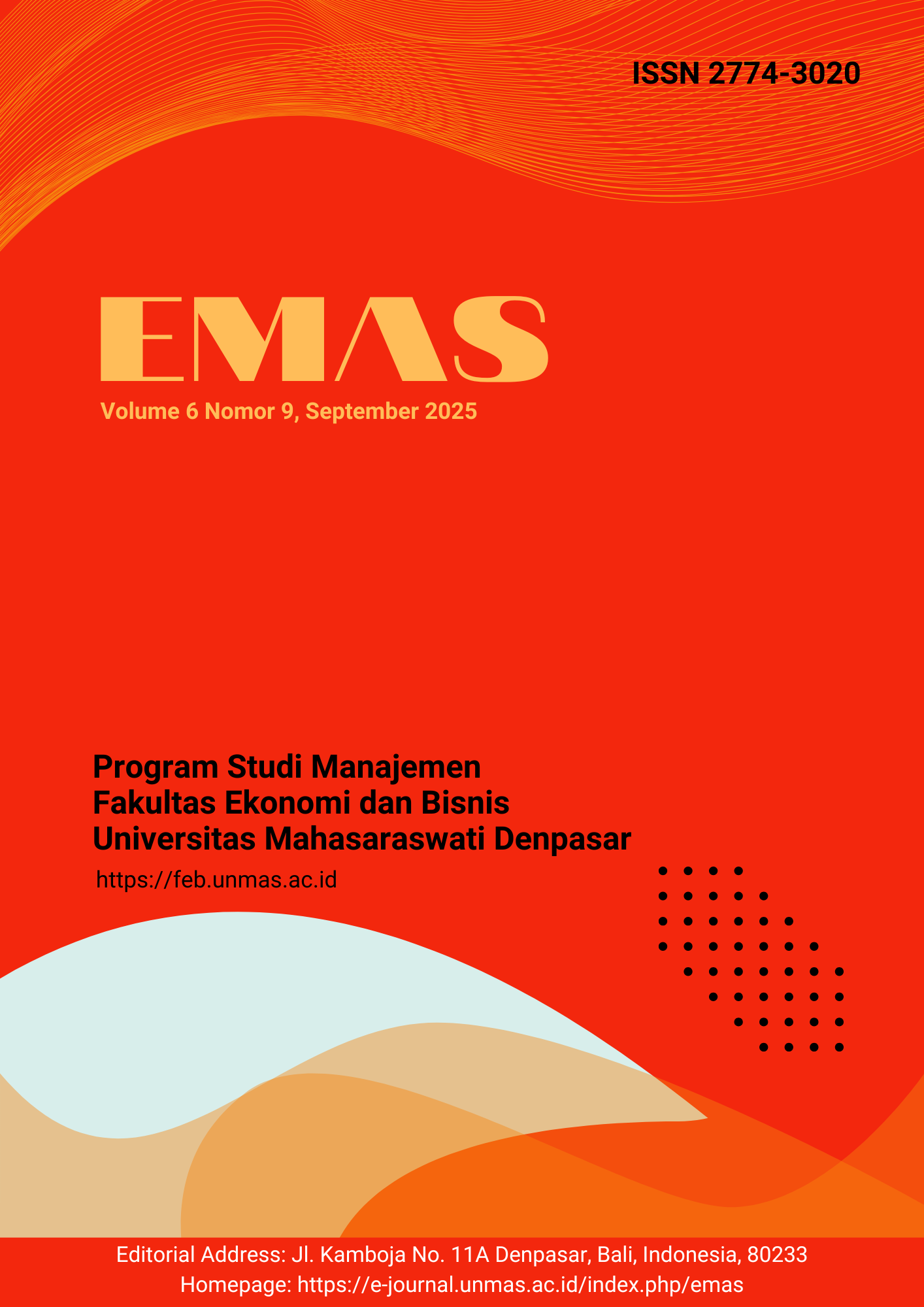DAMPAK STRATEGI REKRUTMEN DAN SISTEM ONBOARDING TERHADAP RETENSI KARYAWAN PADA STARTUP MARKETPLACE
DOI:
https://doi.org/10.36733/emas.v6i9.12369Keywords:
employee retention, evidence-based HRM, hiring strategy, onboarding system, startup marketplaceAbstract
Penelitian ini bertujuan memberikan pemahaman mendalam mengenai hubungan antara strategi perekrutan (hiring strategy) dan sistem orientasi karyawan (onboarding system) terhadap tingkat retensi tenaga kerja di industri startup marketplace. Kajian dilakukan dengan metode Systematic Literature Review (SLR) melalui analisis terhadap 26 publikasi ilmiah periode 2018–2024 yang diperoleh dari basis data Scopus, Web of Science, dan SINTA. Analisis berfokus pada integrasi teori dan temuan empiris yang menggambarkan keterkaitan praktik rekrutmen dan onboarding dengan pencapaian retensi karyawan. Hasil kajian mengungkap bahwa rekrutmen berbasis kesesuaian nilai (value-based hiring), pemanfaatan teknologi seperti Artificial Intelligence (AI) dan Applicant Tracking Systems (ATS), serta penerapan Realistic Job Preview (RJP) secara konsisten terkait positif dengan intention to stay dan persepsi kecocokan (perceived fit). Sementara itu, model onboarding yang adaptif dan memadukan guided socialization dengan task-based mentoring terbukti memperkuat keterikatan emosional serta rasa memiliki terhadap organisasi, sehingga mendukung retensi jangka panjang. Temuan ini menegaskan perlunya penerapan evidence-based Human Resource Management (HRM) di lingkungan startup, dengan mendorong sinergi antara proses rekrutmen dan onboarding sebagai strategi pengelolaan SDM. Kajian ini juga menghasilkan kerangka konseptual berbasis literatur terbaru yang dapat dijadikan landasan penelitian kuantitatif lanjutan.
References
Allen, D.G., Bryant, P.C., & Vardaman, J.M. (2020). Retaining talent: Replacing misconceptions with evidence-based strategies. Academy of Management Perspectives, 34(3), 293–318.
APJII. (2024). Laporan survei internet APJII 2024. Asosiasi Penyelenggara Jasa Internet Indonesia.
Blau, P.M. (1964). Exchange and power in social life. New York: John Wiley & Sons.
Deci, E.L., & Ryan, R.M. (2000). The “what” and “why” of goal pursuits: Human needs and the self‐determination of behavior. Psychological Inquiry, 11(4), 227–268.
Frogeli, E., Björklund, C., & Svartengren, M. (2023). Newcomer onboarding: Effects on organizational identification and work engagement. Journal of Occupational and Organizational Psychology, 96(3), 721–742.
Holmes, O., Jiang, K., Avery, D.R., McKay, P.F., & Tillman, C.J. (2021). A meta-analysis integrating 25 years of diversity climate research. Journal of Applied Psychology, 106(7), 1007–1031.
Indonesia Digital Creative Industry Outlook. (2023). Laporan industri kreatif digital Indonesia. Jakarta: Kementerian Pariwisata dan Ekonomi Kreatif.
Ju, D., Lan, J., Li, Y., Feng, T., & You, S. (2021). When and how newcomers’ organizational socialization and job satisfaction impact creativity: The role of self-efficacy and supportive climate. Journal of Organizational Behavior, 42(5), 557–573.
Kammeyer-Mueller, J., Wanberg, C.R., Rubenstein, A.L., & Song, Z. (2022). Support, socialization, and newcomer adjustment: Meta-analytic evidence for the effects of socialization tactics. Personnel Psychology, 75(1), 1–37.
Kristof-Brown, A.L., Zimmerman, R.D., & Johnson, E.C. (2005). Consequences of individuals’ fit at work: A meta-analysis of person–job, person–organization, person–group, and person–supervisor fit. Personnel Psychology, 58(2), 281–342.
Luna-Sinisterra, R., Guerrero, S., & Herrera, J. (2024). Self-determination theory and employee retention: The mediating role of psychological need satisfaction. Human Resource Management Journal, 34(1), 45–63.
Mazlan, M.A., & Jambulingam, M. (2023). Value congruence and employee loyalty: The mediating role of affective commitment. International Journal of Human Resource Studies, 13(2), 15–34.
Medium. (2022). Why startup employee turnover is so high in Indonesia. [online] Available at: https://medium.com
Mosquera, P., & Soares, C. (2025). Realistic job previews in high-turnover industries: Evidence from field experiments. Human Resource Development Quarterly, 36(1), 55–76.
Newlands, G., Lutz, C., & Fieseler, C. (2024). Algorithmic recruitment and selection in the gig economy. New Technology, Work and Employment, 39(1), 75–93.
Nosratabadi, S., Mosavi, A., & Lakner, Z. (2022). Food supply chain and business model innovation: AI-based recruiting in agribusiness startups. Sustainability, 14(1), 1–16.
Page, M.J., McKenzie, J.E., Bossuyt, P.M., Boutron, I., Hoffmann, T.C., Mulrow, C.D., ... & Moher, D. (2021). The PRISMA 2020 statement: An updated guideline for reporting systematic reviews. BMJ, 372, n71.
PRISMA. (2021). PRISMA 2020 flow diagram. [online] Available at: http://www.prisma-statement.org
Santos, A., Silva, R., & Ferreira, A. (2024). Digital onboarding in hybrid work environments: Impacts on employee integration and retention. Journal of Business Research, 162, 113880.
Zamri, M.A., & Halim, H.A. (2024). Perceived organizational support as a mediator in the relationship between onboarding and employee retention. Asian Journal of Business Research, 14(1), 25–40.
Downloads
Published
How to Cite
Issue
Section
License
Copyright (c) 2025 EMAS

This work is licensed under a Creative Commons Attribution-NonCommercial-ShareAlike 4.0 International License.





